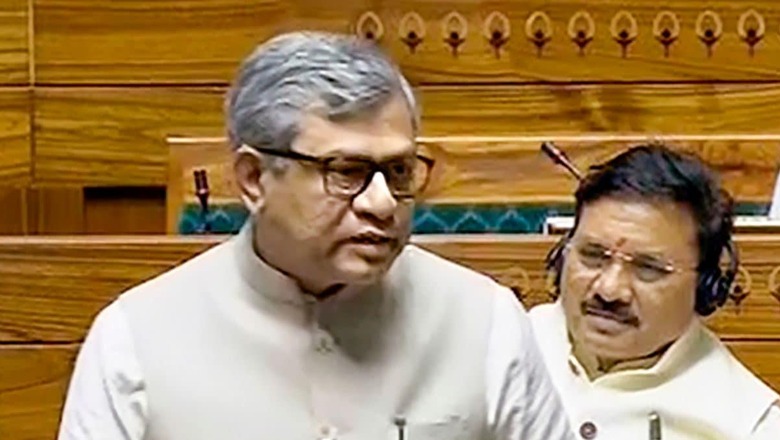
views
The Telecom bill, tabled by IT and Communications Minister Ashwini Vaishnaw in the Lok Sabha, perfectly balances economic interests, customer safety and national security. The provisions have been received well by the industry, which has been calling for regulatory reforms for a long time. The new regime will result in greater sophistication of India’s telecom industry, enhance customers’ safety and experience and elevate India’s telecom sector into the new era of 5G and satellite broadband.
The Telecommunications Bill of 2023 introduced in the Lok Sabha on Monday marks a significant overhaul of the nation’s telecommunications laws. This proposed legislation, the first-of-its-kind in 138 years, aims to streamline various elements such as spectrum management and authorisation, right of way and dispute resolution into a single updated statute.
This long-anticipated law, which has been in development for several years, is set to replace the Telegraph Act of 1885. The 2023 Telecommunications Bill additionally aims to revise the Telecom Regulatory Authority of India (TRAI) Act of 1997.
The bill proposed by Vaishnaw seeks to revamp and streamline the regulatory and licensing framework for telecommunications, eliminating obstacles in the establishment of telecom infrastructure, safeguarding user interests, and instituting a four-tiered structure for dispute resolution.
“The bill [seeks] to amend and consolidate the law relating to development, expansion and operation of telecommunication services and telecommunication networks; assignment of spectrum; and for connected matters,” Vaishnaw had said as he introduced the bill.
FROM ‘LICENSING’ TO ‘AUTHORISATION’
The bill seeks to remove the ‘licensing’ regime of the past and replace it with the provision of ‘authorisation’ instead. The term ‘licensing’ has been completely done away with in the newly proposed legislation.
The prospective law consolidates the existing licensing system, which involves the issuance of at least 100 various licences, into a streamlined structure that categorises nearly all of them into three permissions: for telecom services, telecom networks, and radio equipment.
Spectrum will now be assigned by the government through an “administrative process” and no longer through auctions when it comes to areas concerning national security, defence and so on. The government has placed emphasis on auctioning spectrum to telecom service operators for various purposes, except in the case of 19 specific reasons enumerated in the First Schedule. These reasons encompass national security, defence, law enforcement, crime prevention, public broadcasting services, disaster management, BSNL and MTNL, among others. For these cases, the government will allocate spectrum through an “administrative process,” bypassing the auction mechanism.
This significantly narrows down the operating space for lobbying entities and protects national security and economic interests while creating a level playing field for all.
INTERNET FROM SPACE
In what would ensure that every remote corner of India is connected to the internet, the government has opened up the satellite spectrum for satellite-based internet communication.
Instead of auctions, the government plans to assign satellite spectrum to entities such as Airtel’s OneWeb, Jio’s Satellite Communications, Elon Musk’s Starlink, and Amazon’s Project Kuiper through the administrative process.
The question of whether to assign spectrum administratively or mandate open auctions for satellite firms had been a source of contention between domestic and international players in the past. However, the new provision of administrative allotment makes way for international players in line with global norms while safeguarding the space sector.
It’s crucial to highlight that the customary practice worldwide for allocating satellite spectrum has been through administrative allocation rather than auctioning. This distinction arises because satellite spectrum, unlike terrestrial spectrum, is not confined by national borders. The coordination and management of satellite spectrum fall under the purview of the International Telecommunication Union (ITU), a United Nations body.
The Indian Space Association said in a statement, “This decision to allocate the satellite spectrum through a globally harmonised administrative method will pose a greater good for the nation and will spur growth in the nascent space sector, foster healthy competition, and ensure a level playing field for all stakeholders involved.”
OPTIMISATION OF AIRWAVES
The bill seeks to not only simplify the authorisation process, but also optimise the use of the spectrum meeting long-standing demands from the industry.
To ensure that spectrum is not wasted as may be the case owing to the current problem of licensing-related limitations, the government seeks to allow re-farming, harmonisation and sharing of spectrum.
“Refarming” of spectrum enables telecom companies to use it for technologies other than the ones originally intended at the time of purchase. For instance, the bill allows the repurposing of 4G spectrum for 5G use.
Additionally, the spectrum can undergo “harmonisation” by the rearrangement of its frequency range. The government will also permit sharing, trading and leasing, allowing strategic sharing across different geographic locations by various telecom operators. Spectrum can also be surrendered if lying unused.
CRACKDOWN ON CYBERCRIME
The proposed legislation also seeks to establish stringent punitive actions to prevent fraud and protect customers from cybercrimes.
In a bid to fight rampant cybercrimes, the acquisition of SIM cards or other telecommunication identifiers through “fraud, cheating, or personation” is also suggested to be punishable with a jail term of up to three years and/or a fine of up to Rs 50 lakh. Engaging in the tampering of telecom identifiers or using telecom identifiers that are not duly allotted or permitted will similarly be subject to penalties. Individuals knowingly utilising unauthorised telecommunication services may face fines of up to Rs 10 lakh.
The bill mandates that telecom customers undergo “biometric authentication”, the specific form of which will be notified at a later date. This measure has been implemented to address the issue of spam calls and messages. Mandatory biometric authentication remains a bone of contention, however, for privacy advocates who cite risks to personal data.
Further, in what appears to be a stringent provision against hacking, individuals gaining “unauthorised access to a telecommunication network or data of an authorised entity or transfers data of an authorised entity” or unlawfully intercepting a message, can face imprisonment for up to three years and/or a fine of up to Rs 2 crore. The term “unauthorized access” in this context specifically pertains to various forms of hacking and includes data records such as internet protocol data records, traffic data, subscriber data records, and similar categories.
SURVEILLANCE POWERS AND NATIONAL SECURITY
Recognising the telecom sector as a strategic one, the bill is mindful of the national security aspect of regulation. It emphasises the power to control the flow of telecom equipment to prevent being compromised to hostile powers such as China.
The regime of “trusted sources”, instituted in response to the 2020 Indo-Chinese border conflicts to prevent the import of telecom equipment from adversarial nations, will be incorporated into the law if the bill is approved.
A “voluntary undertaking” system will enable telecom companies to voluntarily report compliance lapses, and a three-tier adjudicatory mechanism will be established to address disputes.
The legislation also retains the power of surveillance and interception of telecom communications. Provisions related to lawful interception, or the surveillance of telecom communications, have been maintained in accordance with the previous Act. The bill grants the Union government the authority to take control of a telecom network in the event of public emergencies or safety concerns.
Furthermore, the bill contains updates to right-of-way laws empower local authorities such as district magistrates with increased authority to resolve disputes.
WHAT IT MEANS FOR OTTS
The bill has carefully addressed concerns and confusion around the regulation of OTTs, and the government does not plan to expand its regulatory role in this area so far.
While there is no direct measure announced in the bill towards the regulation of Over-the-top (OTT) media services, it empowers the government to subject OTT services to any form of regulation it may deem necessary in the future.
OTTs are already under regulation under various rules administered by the Ministry of Electronic and Information Technology and the Ministry of Information and Broadcasting.
WELCOMED BY INDUSTRY
The bill has the welcomed by industry experts across the board. Telecom industry veterans and associations laud the legislation for establishing a well-defined Right of Way (RoW) framework, expressing confidence that these affirmative measures will substantially expedite the provision of digital connectivity benefits to every citizen of India.
According to Airtel’s CEO Gopal Vittal, the bill will simplify the licensing regime and usher in certainty in areas such as spectrum harmonisation, and trading/leasing/sharing and surrender of unused spectrum.
“As the Bill ushers in simplification in telecom licensing regime, carrying on the intent of reforms started in September 2021, the Bill will bring predictability in crucial areas related to spectrum such as harmonisation, surrender of unused spectrum, primary and secondary assignments among others,” he said in a statement.
Akshaya Moondra, CEO of Vodafone-Idea Limited, also welcomed the provisions of the bill. “The bill carries several forward-looking provisions that will help deliver the benefits of digital connectivity to all our citizens. We welcome the rationalisation of penalties and the legal enforceability of right-of-way provision a longstanding requesting the industry,” she said.
The telecom bill has also been welcomed by the Internet and Mobile Association of India (IAMAI), which serves as the representative body for nearly 600 internet firms and startups.
IAMAI indicated that the bill has maintained the distinction between entities owing and controlling the spectrum which need to be regulated, and those using the spectrum for services. In a statement, IAMAI added that the bill “excludes email, internet-based communication services, broadcasting services, machine to machine communication services, and over the top (OTT) communication services”. The IAMAI termed the bill as “progressive” for keeping internet providers out of the ambit of regulation.
Overall, the final draft of the telecommunications bill tabled by Vaishnaw is expected to sail through without further hassles. The provisions of the legislation have perfectly balanced economic interests, customer safety and national security, and have been received well by the industry which has been calling for regulatory reforms for a long time. The new regime will result in greater sophistication of India’s telecom industry and enhance customers’ safety and experience.

















Comments
0 comment